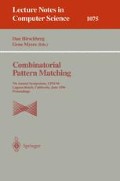Abstract
In this paper, we describe an architecture for helping in the construction of concept hierarchies. This architecture is based on machine learning and on cognitive psychology studies in concept formation. Our basic assumption is that concept formation should be considered as a goal-driven, context-dependent process and, therefore, that the hierarchical organization of concepts should be represented in different perspectives. The core of our architecture is a learning system that generates multi-perspective hierarchies. The evaluation of the architecture is realized from a perspective of both the comprehensibility and the prediction power of the generated knowledge.
Preview
Unable to display preview. Download preview PDF.
References
Barsalou, L.W.: Ad Hoc Categories. Memory and Cognition, 11(3), 1983.
Boose, J., Schema, D., Bradshaw, I: Recent Progress in AQUINAS: A Knowledge Acquisition Workbench. EKAW, 1988.
Faucher, C.: Elaboration d'un langage extensible fondé sur les schemas le langage objlog+. Thèse de doctorat, Université de Droit, d'Economie et des Sciences d'Aix-Marseille, 1991.
Fisher, D.H.: Knowledge Acquisition via Incremental Conceptual Learning. Machine Learning, vol 2, numero 2, 1987.
Fisher, D., Yoo, J.: Categorization, Concept Learning, and Problem-Solving: A Unifying View. The Psychology of Learning and Motivation. Vol 29. 1993.
Gennari, J.H, Langley, P., Fisher, D.: Models of Incremental Concept Formation. Artificial Intelligence, 40, 1989.
Gluck, M. A., Corter, I.E.: Information, uncertainty, and the utility of categories. Proc. of the 7th Annual Conference of the Cognitive Science Society. Irvine, CA, Lawrence Erlbaum, 1985.
Hampton, J. Dubois, D.: Psychological Models of Concepts: Introduction. In Categories and Concepts: Theoretical Views and Inductive Data Analysis. Academic Press, 1993.
Marino, O., Rechenmann, F., Uvietta, P.: Multiple Perspectives and Classification Mechanism in Object-Oriented Representation. Cognitiva 90, 1990.
Martin, J., Bilman, D.: Acquiring and Combining Overlapping Concepts. Machine Learning, 16, 121–155, 1994.
Michalski, R., Carbonnel, J., Mitchell, T.: Machine Learning, An Intelligence Approach. Vol II. Morgan Kaufmann, CA. 1986.
Michalski, R.: Inferential Theory of Learning: Developing Foundations for Multistrategy Learning. In Machine Learning: A Multistrategy Approach. Michalkski(Ed).Vol.IV. M.Kaufmann, 1994.
Morik, K.: Sloppy Modeling. In Knowledge Representation and Organization in Machine Learning,Morik (Ed). Spring-Verlag, 1989.
Morik, K.: Balanced Cooperative Modeling. Michalski and Tecuci(Eds), Machine Learning: A Multistrategy Approach. Vol. IV. Morgan Kauffmann, 1994.
Ram, A., Leake, D.: Goal-driven Learning. MIT Press, 1995.
Reich, Y., Fenves, S.: Inductive Learning of Synthesis Knowledge. International Journal of Expert Systems. Vol 5, Num. 4, 1992.
Rosch, E., Mervis, C.: Family Resemblances: studies in the internal structure of categories. Cognitivie Psychology 7, 1975.
Seifert, C.: A Retrieval Model Using Feature Selection. Proc. of the 6th Int. Workshop on Machine Learning. Morgan Kaufmann. 1989.
Smith, E.E, Medin, D.L.: Categories and Concepts. Library of Congress Cataloging in Publication Data. Cognitive Science, 1981.
Thaise: L'approche logique de l'intelligence artificiel. Tome 4: De l'apprentissage artificiel aux frontières de l'IA. Chapitre 1, 1991.
Vasco, J.J.F, Faucher, C., Chouraqui, E.: Frame Hierarchies Construction using Machine Learning. 6th ASIS Conference. SIG/CR Classification Research Workshop. Chicago, 1995.
Vasco, J.J.F., Faucher, C., Chouraqui, E.: Knowledge Acquisition Based on Concept Formation Using a Multi-Perspective Representation. Florida Artificial Intelligence Research Symposium FLAIRS/95. 1995.
Author information
Authors and Affiliations
Editor information
Rights and permissions
Copyright information
© 1996 Springer-Verlag Berlin Heidelberg
About this paper
Cite this paper
Vasco, J.J.F., Faucher, C., Chouraqui, E. (1996). A knowledge acquisition tool for multi-perspective concept formation. In: Shadbolt, N., O'Hara, K., Schreiber, G. (eds) Advances in Knowledge Acquisition. EKAW 1996. Lecture Notes in Computer Science, vol 1076. Springer, Berlin, Heidelberg. https://doi.org/10.1007/3-540-61273-4_15
Download citation
DOI: https://doi.org/10.1007/3-540-61273-4_15
Published:
Publisher Name: Springer, Berlin, Heidelberg
Print ISBN: 978-3-540-61273-5
Online ISBN: 978-3-540-68391-9
eBook Packages: Springer Book Archive

